The Sickening Theory of the “Q” in LGBTQ+ (Patreon)
Downloads
Content
 </figure>
</figure>Before we start, let me establish a couple things.
・The Q in LGBTQ+ stands for “Queer.”
・The subject of this article is “Queer Theory”
・I am not associating LGBT people with Queer Theory; I think it is unfortunate that they are lumped in with “queer” per the acronym LGBTQ+.
・This article is criticizing Queer Theory, not people who identify themselves as “queer” in general as I have no idea how many queer people actually subscribe to Queer Theory.
Here is Wikipedia’s description of “Queer Theory”:
It functions essentially as a perspective that questions cisgender and heterosexual identities being perceived as the standard and provides a thesis that revisits that field with a "queer" approach.
Translation: Queer Theory is saying that perhaps it is arbitrary that being a heterosexual person with normal sexual appetites is normal. Queer Theory is about questioning what is normal. Why do heterosexual people get to be considered normal? Queer Theory asks why are certain things “normal” in society and argue that these “norms” are in fact constraining to people who do not adhere to these norms. Put another way, the queer are in some way oppressed by societal norms.
OK… Doesn’t seem nefarious at this point. So how in the world do you get people saying things like this?
“The fundamental goal for the Queer Theory people is the normalization of pədophilia.” -Rob Smith
"Somehow it ends up that, all social norms are inherently constraining and must be transgressed, which is why famous Queer theorists from Foucaul to Judith Butler have argued in favor of pədophilia and things like that." - Professor Derrick Smith
Sounds like a huge prejudiced accusation requiring quite the leap, right?
Unfortunately, no.
As we’ll see, attempts to justify pədophilia are written clearly in the Queer Theory literature, plain as day. Queer Theory literature from the 1970’s all the way to 2016 has been in defense of pədophilia and in multiple cases, the “thinkers” that have contributed to the literature were pədophiles themselves.
Before we continue, again: I am not accusing anyone or a group of people of being pədophiles. I am saying that the conceptual framework of Queer Theory sets up a thread of logic that attempts to justify pədophilia. Also as you saw from the first paragraph, I am specifically trying to distance LGBT people from this discussion - I am not associating them with this; I am not saying anyone is guilty by association.
<figure>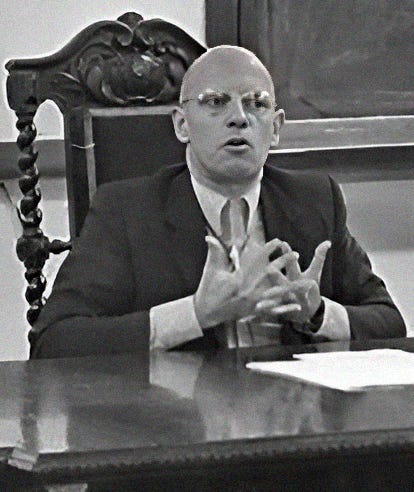 </figure>
</figure>1970’s - Influential French pədophile, Foucault
Let’s start with Michel Foucault, who was a writer and political activist active from the late 60’s to the early 80’s. His work on sexuality was highly influential in the formation of Queer Theory. He’s in fact had a very large impact on academia, particularly in Social Sciences and Humanities. Foucault is cited at least 1.3 million times. Just the citations listed on Google Scholar put the number of times he was cited at 1,302,583.
He’s also well known to be a pədophile. Windsor Star described him as a "pədophile guru." Intellectual Guy Sorman called Foucault a “pədophile rapist.”
In 1977 Michel Foucault signed a petition against the age of consent laws, arguing that a child has the ability to “consent” to sex with an adult. The same year, Michel Foucault presented to the Commission for the Revision of the Penal Code to lower the age of consent to 13.(S) Foucault also wrote an open letter in the newspaper Le Monde defending three pədophiles who had sex with minors.(S)
An article published March 28th, 2021 in The Sunday Times describes how Guy Sorman reported that he witnessed “Foucault courting young boys during his time in Tunisia when the French philosopher took a philosophy professorship at the University of Tunis.”
“They were eight, nine, ten years old, he was throwing money at them and would say ‘let’s meet at 10 p.m. at the usual place’,” he said, adding: “He would make love there on the gravestones with young boys. The question of consent wasn’t even raised.”
Sorman said that while he regrets not coming forward with the accusations earlier, the French media was covering up for the philosopher, saying:
“There were journalists present on that trip, there were many witnesses, but nobody did stories like that in those days. Foucault was the philosopher-king. He’s like our god in France.”
Sorman said that that Foucault “thought his arguments gave him permission to do whatever he wanted.”
If you’re not sufficiently disturbed, you can read the 2022 Promoting Admiration of Foucault Hiding his Defense of Rape and Pederasty. (Pederasty refers to an adult male being attracted to a male child.)
Michel Foucault died of AIDS-related complications in Paris in 1984, the same year Gayle Rubin published her influential text Thinking Sex which is widely regarded as the founding text of queer theory.
<figure>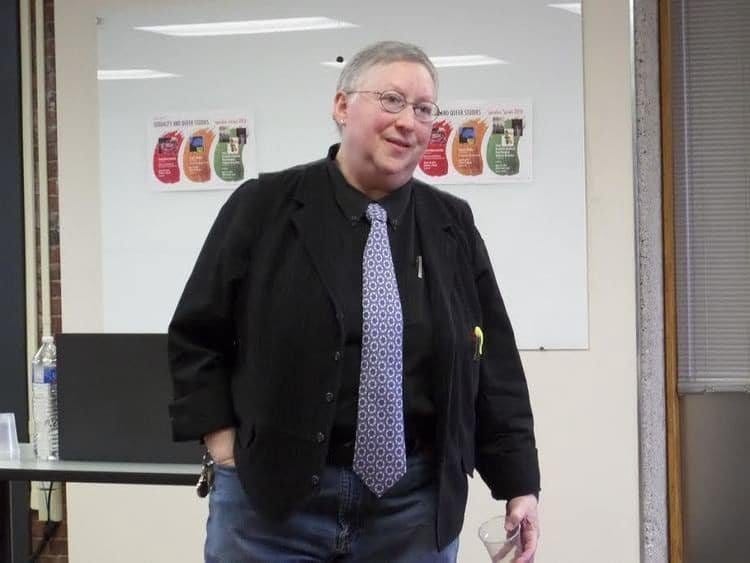 </figure>
</figure>1980’s - The “Founding Text” of Queer Theory
Gayle Rubin has a PhD in Anthropology from the University of Michigan and has been teaching students at the University of Michigan since 2003. Here is a direct quote from her 1984 essay Thinking Sex, which again is regarded widely as the founding text of queer theory:
“The laws produced by the child porn panic are ill-conceived and misdirected.”
In case you needed more context, what ill-conceived and misdirected laws is she referring to? In her words, laws that prohibit “any depiction of minors who are nude or engaged in sexual activity” are the ones she’s referring to as “ill-conceived.”
She laments that the laws are so harsh that “even the private possession” of such materials is criminalized.
“Although the Supreme Court has also ruled that it is a constitutional right to possess obscene material for private use, some child pornography laws prohibit even the private possession of any sexual material involving minors.”
Gayle Rubin was troubled that no one opposed such laws, writing:
They represent far reaching alterations in the regulation of sexual behaviour and abrogate important sexual civil liberties. But hardly anyone noticed as they swept through Congress and state legislatures.
Much of her article is undeniably dedicated to the defense of pədophiles, or, in her words: “boy lovers.” She writes:
“It is harder for most people to sympathize with actual boy-lovers. … boylovers are so stigmatized that it is difficult to find defenders for their civil liberties, let alone for their erotic orientation.”
Later in the article she likens the desire to have relations with a child to having a taste for spicy food.
“A person is not considered immoral, is not sent to prison, and is not expelled from her or his family, for enjoying spicy cuisine.”
Let’s move on to 1990 when Judith Butler’s book Gender Trouble came out. Judith Butler is considered to be another “core theorist” in the development of queer theory.
<figure> </figure>
</figure>Joseph Everett’s Newsletter is a reader-supported publication. To receive new posts and support my work, consider becoming a free or paid subscriber.
Subscribed
1990’s - Product of Foucault and Rubin: Judith Butler
Judith Butler is a professor in the graduate school of the University of California Berkeley and her work has been translated into 27 different languages. Judith Butler’s thinking was heavily influenced by Foucault and she often cited the “queer thinker” Gayle Rubin in her early works.
Judith Butler was recently featured this month on a Youtube channel with 5 million subscribers - Big Think. The channel has had on big figures like Michio Kaku, Neil Degrasse Tyson, Steven Pinker, Sam Harris, Richard Branson, Stephen Fry, Ray Kurzweil and Richard Dawkins. The first time she was featured on the Big Think channel was 12 years ago in the video titled Your Behavior Creates your Gender which received 1.3 million views.
I wonder if Big Think was aware that Judith Butler argued in her 2004 book Undoing Gender that there are instances when parent-child incəst is NOT a "violation." Here is a quote from the book:
So I keep adding this qualification: “when incəst is a violation,” suggesting that I think that there may be occasions in which it is not. Why would I talk that way? Well, I do think that there are probably forms that are not necessarily traumatic or which gain their traumatic character by virtue of the consciousness of social shame that they produce.
So she is saying that is the societal norms that dictate whether incəst is bad or not. In other words, she’s saying incəst being bad is a “social construct.”
Judith Butler is well known for her 1990 book Gender Trouble: Feminism and the Subversion of Identity which presents the idea that gender, and sexuality are not grounded in biology and are constructed by society, with gender being likened to a “performance,” and that people are coerced by society into performing their gender. That is, gender is a “social construct.”
Butler is saying that gender is not determined by hormones, chromosomes or physiology but it’s a social construct. Could there be a way to test this theory? Well, that’s exactly what psychologist John Money wanted to do.
<figure>David Reimer, raised as a girl on Psychologist John Money’s “professional” advice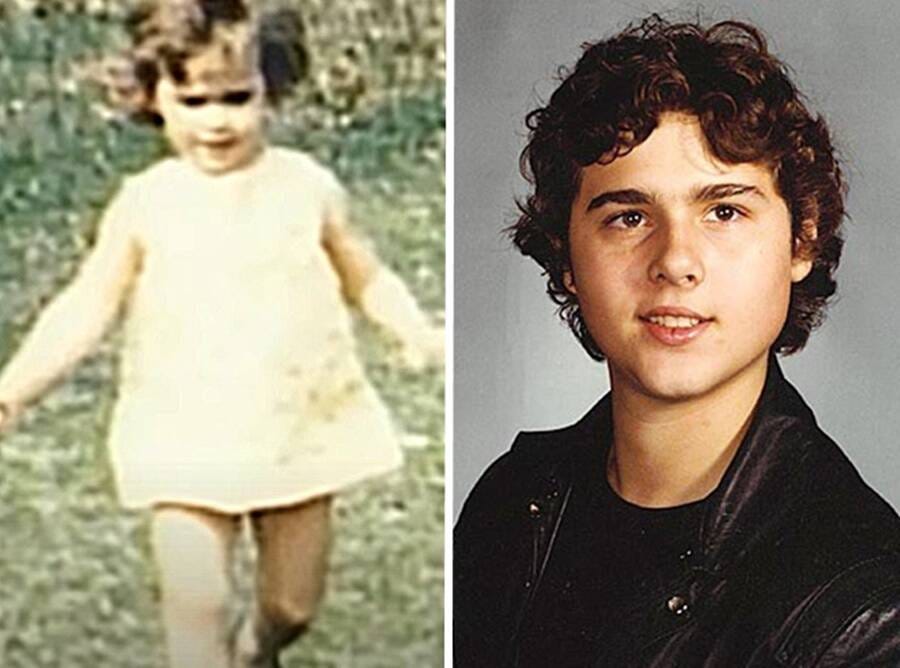 </figure><figure>John Money
</figure><figure>John Money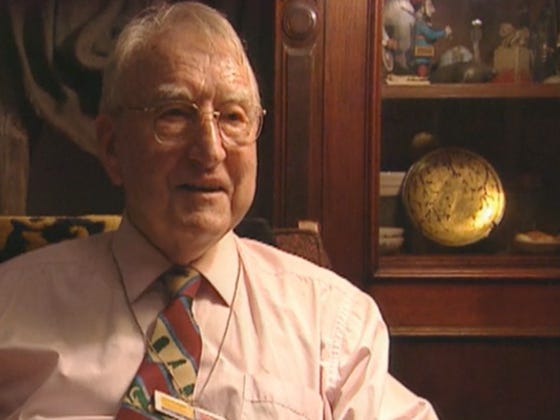 </figure>
</figure>1990’s - Psychologist pədophile’s “success” is revealed to be a lie
John William Money was a New Zealand American psychologist, sexologist and professor at Johns Hopkins University known for his research on human sexual behavior and gender. He established the “Gender Identity Clinic” at Johns Hopkins University.
One year before he would receive the James McKeen Cattell Fellow Award, he was quoted in 1991 by the pro-pədophile magazine, Paidika, having said:
“If I were to see the case of a boy aged ten or eleven who’s intensely erotically attracted toward a man in his twenties or thirties, if the relationship is totally mutual, and the bonding is genuinely totally mutual, then I would not call it pathological in any way.”
John Money had wanted a “scientific” way to test the idea that sex is not biological fact but a social construct. He would finally have his chance when the distressed mother of a badly injured baby came to request Money’s help.
David Reimer was an identical twin boy born in Canada in 1965. When he was 8 months old, his penis was irreparably damaged during a botched circumcision. They had no idea what to do about the fact that their son lacked a penis, so in 1967 they reached out in desperation to the distinguished psychologist John Money who they had seen on television.
Subscribed
David became Money’s subject for testing the idea that gender is a social construct. The plan was to remove the child’s testicles, fashion him a pseudo-vagina, give him female hormones and instruct the parents to raise him as a daughter. Money told the parents that it would be in the best interest of David to raise him a a girl. David was raised as a girl for most of the first 14 years of his life. Money presented his experiment as a total success and it was claimed that it resolved the debate over the cultural and biological determinants of gender.
It wasn’t until the mid 90’s that the depraved truth of this experiment would surface. First off, David and his twin brother were to have an annual check in with John Money at his office. Let me quote from a 2017 paper from Arizona University:
During the twin’s psychiatric visits with Money, and as part of his research, Reimer and his twin brother were directed to inspect one another’s genitals and engage in behavior resembling sexual intercourse. Reimer claimed that much of Money’s treatment involved the forced reenactment of sexual positions and motions with his brother. In some exercises, the brothers rehearsed missionary positions with thrusting motions, which Money justified as the rehearsal of healthy childhood sexual exploration. In his Rolling Stone interview, Reimer recalled that at least once, Money photographed those exercises. Money also made the brothers inspect one another’s pubic areas. Reimer stated that Money observed those exercises both alone and with as many as six colleagues. Reimer recounted anger and verbal abuse from Money if he or his brother resisted orders, in contrast to the calm and scientific demeanor Money presented to their parents.
Let me quote one more section from that paper:
[David] Reimer reported that he did not identify as a girl and resented Money’s visits for treatment. At the age of thirteen, Reimer threatened to commit suicide if his parents took him to Money on the next annual visit. Bullied by peers in school for his masculine traits, Reimer claimed that despite receiving female hormones, wearing dresses, and having his interests directed toward typically female norms, he always felt that he was a boy. In 1980, at the age of fifteen, Reimer’s father told him the truth about his birth and the subsequent procedures. Following that revelation, Reimer assumed a male identity, taking the first name David. By age twenty-one, Reimer had received testosterone therapy and surgeries to remove his breasts and reconstruct a penis. He married Jane Fontaine, a single mother of three, on 22 September 1990.
James Money never publicly acknowledged that his experiment was in fact a complete failure. James Money intimidated editors at scientific journals to not publish things refuting his ludicrous claims. When people criticized him, he used a tactic you’ve surely seen employed today. He accused his criticizers as being bigots, that they had an antifeminist and anti-trans bias.
David Reimer, the subject of John Money’s experiment committed suicide at the age of 38.
<figure>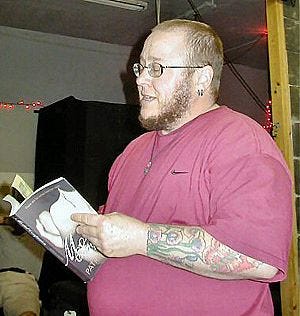 </figure>
</figure>1994 - Pat Califia & Children’s decisions
Let’s briefly take a look at Pat Califia, someone who Xtramagazine describes as “pushing the boundaries of queer culture.” Pat Califia is the author of two books: Macho Sluts and Public Sex
In 1994, Califa said:
Any child old enough to decide whether or not she or he wants to eat spinach, play with trucks, or wear shoes is old enough to decide whether or not she or he wants to run around naked in the sun, masturbate, sit in somebody's lap, or engage in sexual activity.<figure>
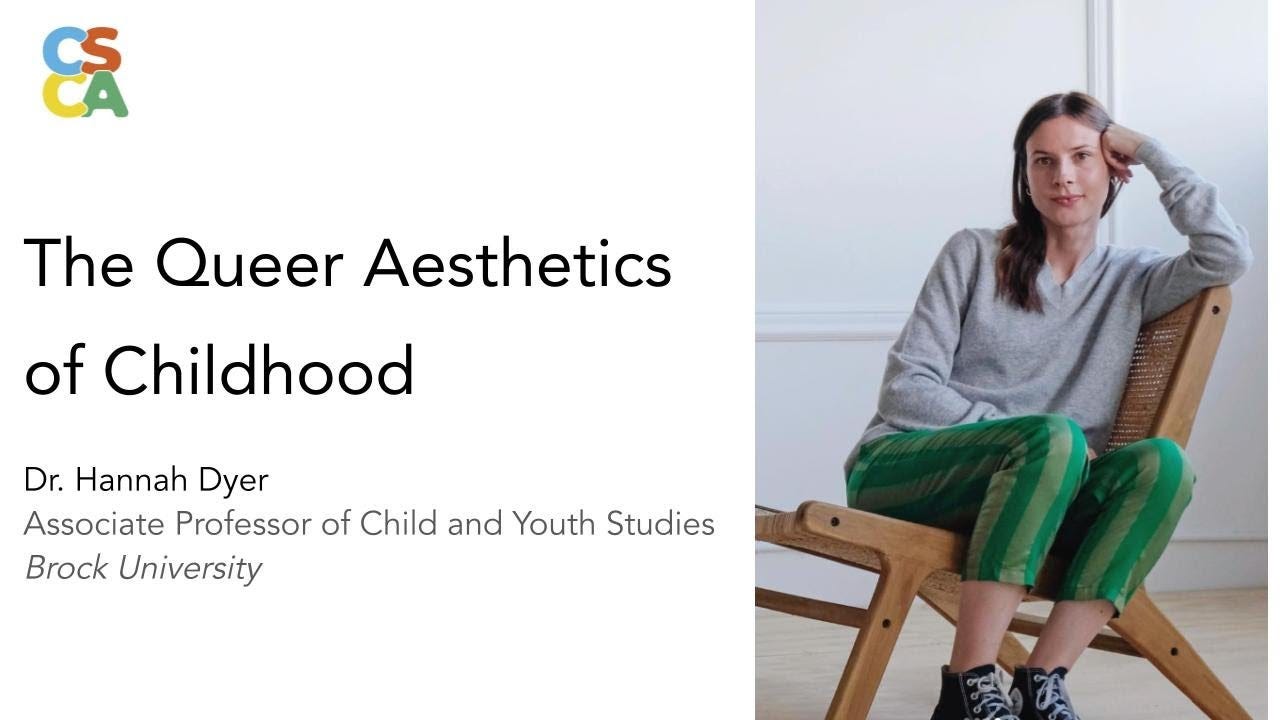 </figure>
</figure>Subscribed
2016 - Hannah Dyer’s rejection of “child innocence”
While doing some extra digging on socialism (discussed in previous posts), I came across James Lindsay who started to gain traction online for his presentation at Oxford presented in a video titled Woke Culture HAS NOT Gone Too Far. (The title is in fact a clever jumping off point for his arguing against woke culture.)
I learned about Hannah Dyer from James Lindsay’s video Groomer Schools 2: Queer Futurity and the Sexual Abuse of Your Children. Here is Hannah Dyer’s profile from Brock University:
Dr. Hannah Dyer is an Associate Professor in the Department of Child & Youth Studies and holds a PhD from the University of Toronto. She is a cultural theorist of childhood with concentration in art/aesthetics, social conflict, queer theory, and psychoanalysis.
In 2016, Hannah Dyer wrote a paper titled Queer futurity and childhood innocence: Beyond the injury of development. Here she says that queer is what “undoes us” and that queer can “work to undo the innocent Child.”
“In this formulation, queer is not what makes us recognizable to the other, it is what undoes us and what, here, can work to undo the innocent Child.”
Through plenty of verbose mental gymnastics, the paper essentially argues that the concept of “childhood innocence” serves to uphold and protect normative ideologies that suppress the possibility of expressing queerness. That is, “childhood innocence” is a social construct that stifles the development of queerness. Sound familiar?
・Foucault said that sexuality is "a historical construct."
・Judith Butler argued that gender is a social construct
・John Money argued that gender is a social construct
・Hannah Dyer is saying childhood innocence is a social construct
THEN
・Gayle Rubin argued that the task of the family was to antagonize queerness to uphold heterosexual norms.
・Hannah Dyer argues that the concept of childhood innocence antagonizes queerness.
Queer theory and politics necessarily celebrate transgression in the form of visible difference from norms. -Jay Stewart
Hannah Dyer somehow attempts to paint childhood innocence in a bad light by saying “cultures that organize themselves around theories of childhood innocence often hurt children’s curiosity and imagination.”
She says that:
“The schematizing of childhood innocence and mutual rhetorics of vulnerability and its exploitation have devalued the child’s sexuality…”
She talks about how the idea that children’s involves with sexuality can lead to trauma “forecloses careful consideration of the child’s agentic relationship to perverse and queer sexuality.” However, she tries to assure the reader that her work “is not interested in minimizing the corporeal or emotional impacts of sexual trauma experienced in childhood,” but that her work is about “understanding the possibility for children and youth to recruit amounts of bodily pleasure.”
She says that our concept of childhood innocence can be hurtful to the child. She writes: “the child can be hurt by theories of precious innocence that punish curiosity and assume the child’s status as victim.”
She then reiterates her idea that childhood innocence is a concept designed to dissuade queerness and protect hetero norms.
“making childhood sexuality a taboo subject is one way to protect the child’s assumed proto-heterosexuality.”
She says that:
“The child has become both a limit and a hope for queer theory. As the literature in this field has revealed, the child is a dense site of meaning for both queer sociality and alienation.”
The paper is just filled with linguistic gymnastics attempting to defend the sexualization of children. Here’s another quote from the paper:
“There remains a palpable nervousness and discomfort in this field of thought and practice when childhood comes into contact with sexuality.”
Discomfort. Yes. AS THERE SHOULD BE
James Lindsay did an excellent breakdown of this paper in the above mentioned video..
Subscribed
<figure>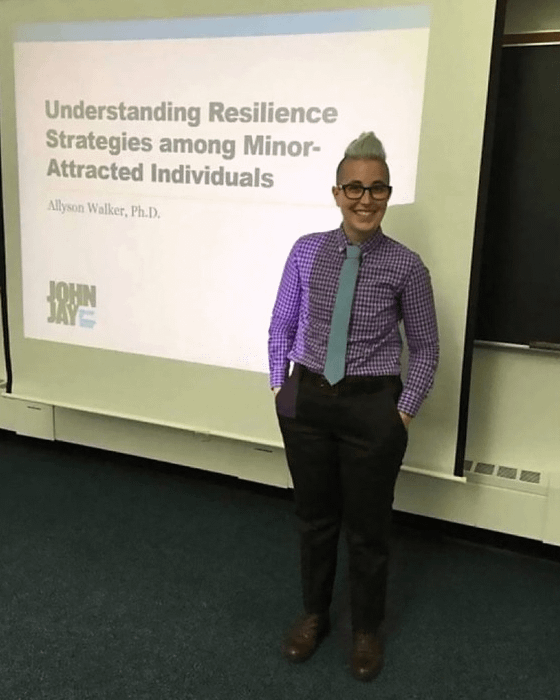 </figure>
</figure>2021 - Allyn Walker attempting to rebrand pədophiles
Allyn Walker is a “queer criminologist,” has a PhD in Criminal Justice and his views are published in academic journals like Critical Criminology. A former professor at Old Dominion University who identifies as non-binary, he resigned once his views on pədophilia came to light. Walker argued that pədophiles should be destigmatized by identifying them as “minor-attracted persons” (“MAPs”) because attraction to children is a sexual orientation and not immoral. Justification of this rebranding is still available on his website.
In an interview with an activist group seeking to dəstigmatize pədophilia, Walker discussed his book, “A Long Dark Shadow: Minor Attracted People and Their Pursuit of Dignity.” He claimed that the stigma was harmful to the pədophile but also to children.
<figure>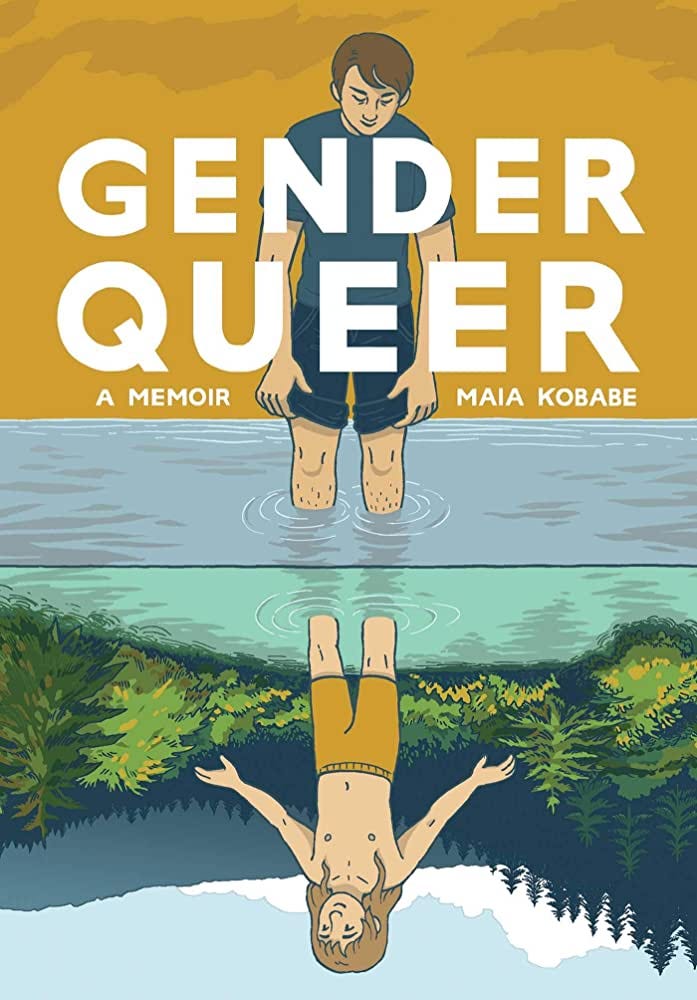 </figure>
</figure>Queer Books for Kids - Where’s the line?
Maia Kobabe wrote a book titled Gender Queer that “recounts Kobabe's journey from adolescence to adulthood and the author's exploration of gender identity and sexuality, ultimately identifying as being outside of the gender binary.”
<figure>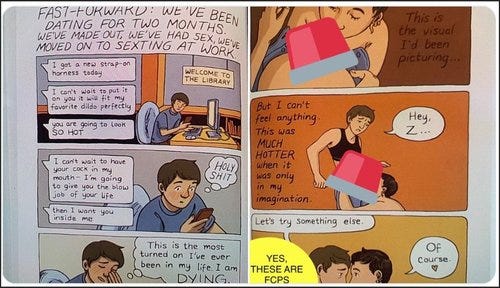 </figure><figure>
</figure><figure> </figure><figure>
</figure><figure>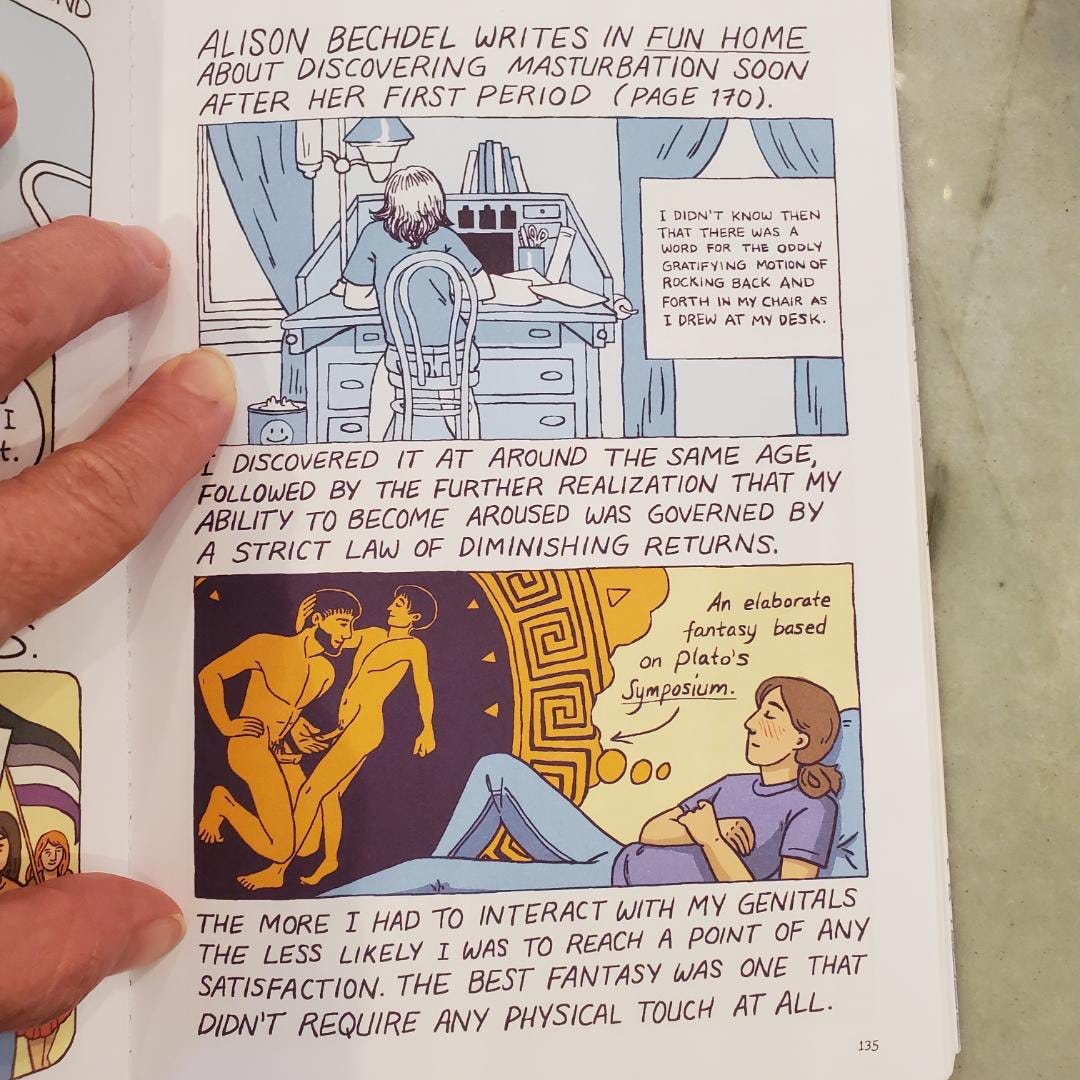 </figure>
</figure>The book has graphic depictions of receiving a blowjob to a strap-on dildo, masturbating while fantasizing about gay sex … and on page 135 there is a literal depiction of pədophilia. With the subtitle “An elaborate fantasy based on Plato’s Symposium,” the adolescent fantasizing and what appears in the thought bubble is a picture of an adult man touching the penis of a young boy (age unclear).
The book doesn’t outright promote pədophilia and I’m not saying Maia Kobabe is a pədophile. However, why are pornographic books encouraging queer sexuality are in school libraries? This book and others like it are available in multiple middle schools. In response to multiple protests from parents, some schools banned it, while other school boards voted to ensure it stayed in the library. Maia Kobabe admits that her book is aimed at children, lamenting that her books are being banned, she says “queer kids need queer stories.”
It strikes me as quite odd that a 33-year-old would make a book for kids about their personal sex odyssey. It’s also odd that some school boards fought against parents to make sure that this book was available to middle school kids.
<figure> </figure>
</figure>Sure, even when I was a kid there was the Swimsuit Edition of Sports Illustrated, the bras section of the Sears Magazines, there were superhero women dressed in tight one pieces, there were video game characters dressed in green thong one pieces, there was the boob scene in American Beauty, and so on.
<figure> </figure>
</figure>However,
・American Beauty was rated R (as in not appropriate for minors.)
・Psylocke from XMen on Fox Kids wasn’t masturbating or having sex.
・Cammy from Street Fighter wasn’t fantasizing about blowing Ryu.
・There were no comic books directed to kids my age giving instructions on performing oral to a girl my age.
・There were no books in any of my elementary, middle or high school teaching me masturbation techniques.
Imagine if a straight 33 year old in the 2000’s published a graphic novel for kids depicting a straight adolescent sexting, receiving blowjobs and fantasizing about sex with an adult was published, put in Middle Schools and then defended himself saying “sexual kids need sexual stories.”
<figure>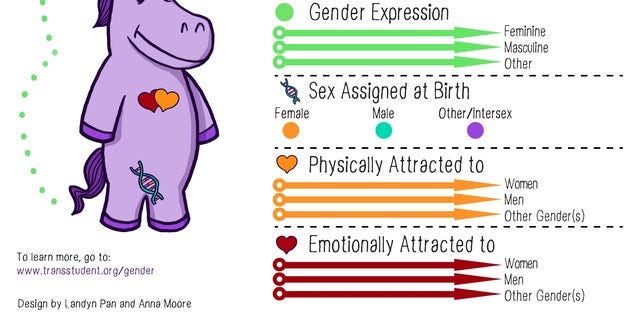 </figure>
</figure>Lastly, in case anyone thinks this is just the paranoia of straight people uncomfortable with LGBTQ+ people exploring their identity, one of the most vocal critics against this type of content directed towards children is the group Gays Against Groomers.
